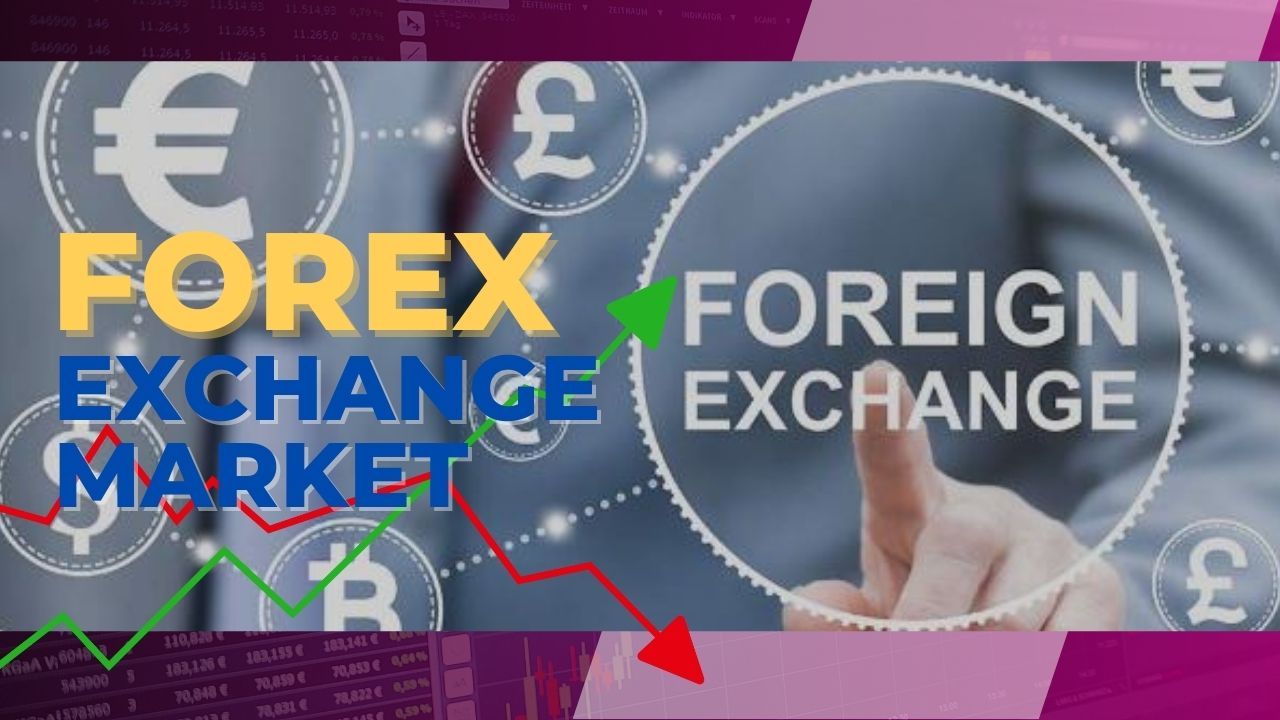Foreign Exchange Market

Futureincomes.site I hope your day is full of blessings. In This Quote let's explore more deeply about Forex. Brief Notes About Forex Foreign Exchange Market read to the end.
"The foreign exchange request is a global decentralized or over-the-counter( OTC) request for the trading of currencies. This request determines foreign exchange rates for every currency. It includes all aspects of buying, dealing and swapping currencies at current or determined prices. In terms of trading volume, it's by far the largest request in the world, followed by the credit request.
The foreign exchange
request works through fiscal
institutions and operates on several
situations. Banks rely on a smaller group of financial companies called
""dealers"" that engage in substantial foreign currency trading behind
closed doors. utmost foreign exchange dealers are banks, so this behind- the-
scenes request is occasionally called the"" interbank request""( although a many insurance
companies and other kinds of fiscal enterprises are involved). Trades between
foreign exchange dealers can be
veritably large, involving hundreds of millions of bones. Because of the
sovereignty issue when involving two currencies, Forex has little( if any)
administrative reality regulating
its conduct.
Through currency conversion, the foreign exchange
request facilitates international trade and investment. For illustration, it permits a business in the
United States to import goods from European Union member countries, especially Eurozone members, and
pay Euros, indeed though its income is in United States bones. It also supports
direct enterprise and evaluation
relative to the value of currencies and the carry trade enterprise, grounded on the discriminational interest rate between two
currencies.
The foreign exchange request is unique because of the following characteristics:
high liquidity due to its
massive trading volume, which makes up the world's largest asset class.
its geographical dissipation.
its nonstop operation 24 hours a day except for
weekends, i.e., trading from 2200 UTC on Sunday( Sydney) until 2200 UTC Friday(
New York).
Market size and liquidity
The foreign exchange
request is the most liquid
fiscal request in the world.
Currency bookies, other marketable pots, fiscal institutions, governments,
central banks, marketable banks, and individuals are examples of dealers.
According to the 2019 Triennial Central Bank Survey, coordinated by the Bank
for International Settlements, average
diurnal development was$7.5 trillion in April 2022( compared to$1.9
trillion in 2004). Of this$6.6 trillion,$2.1 trillion was spot deals and$5.4
trillion was traded in outright forwards,
barters, and other derivations.
There is no central exchange or clearing house;
instead, foreign exchange is transacted in an unorthodox manner through direct
negotiations between brokers and dealers. London, together with the United
Kingdom, is the largest geographic commercial hub. In April 2022, trading in
the United Kingdom reckoned for38.1 of
the aggregate, making it by far the most important center for foreign exchange
trading in the world. Owing to London's dominance in the request, a particular currency's quoted price
is generally the London request price. For case, when the
International Monetary Fund calculates the value of its special delineation rights every day, they use the
London request prices at noon that day.
Trading in the United States reckoned
for19.4, Singapore and Hong Kong account for9.4 and7.1, independently, and
Japan reckoned for4.4.
Development of exchange- traded foreign exchange
futures and options was growing fleetly
in 2004- 2013, reaching$ 145 billion in April 2013( double the development
recorded in April 2007). As of April 2022, exchange- traded currency derivations represent 2 of OTC foreign
exchange development. Foreign exchange futures contracts were introduced in
1972 at the Chicago Mercantile Exchange and are traded further than to utmost other futures contracts.
Market participants
Unlike a stock request, the foreign exchange request
is divided into situations of access. At the top is the interbank foreign
exchange request, which is made up of the largest marketable banks and
securities dealers. Within the interbank request, spreads represent the gap
between the shot( the topmost price a
buyer is willing to pay) and ask( the
lowest price a dealer is willing to accept) prices in trading.
connections play a part in a bank's access to interbank request liquidity.
Banks with reserve imbalances may prefer to borrow from banks with established
connections and can sometimes secure
loans at more favorable interest rates compared to other sources.
The difference between the shot and ask prices widens(
for illustration from 0 to 1 pip to 1 – 2 pips for currencies analogous as the EUR) as you go down the
situations of access. This is duetovolume.However, they can demand a lower
difference between the shot and ask price, which is appertained to as a better
spread, If a dealer can guarantee large
numbers of deals for large amounts. The situations of access that make
up the foreign exchange request are determined by the size of the""
line""( the amount of capitalist with which they are trading). The top-
league interbank request accounts for 51 of all deals. After that, lower banks,
large international pots( taking trouble hedging andcross- border payroll),
major hedge finances, and indeed a numerous retail request makers come into
play. Central banks also partake in the foreign exchange request to align
currencies to their profitable conditions.
Commercial companies
An important part of the foreign exchange request comes from the fiscal conditioning of companies seeking
foreign exchange to pay for goods or services. marketable companies frequently trade fairly small quantities compared to those of banks or
bookmakers, and their trades frequently
have a little short- term impact on
request rates. nonetheless, trade overflows are an important factor in
the long- term direction of a currency's exchange rate. Some transnational
pots( MNCs) can have an
changeable impact when veritably
large positions are covered due to exposures that aren't extensively known by
other request actors.
Central banks
National central banks play an important part in the foreign exchange requests. They try to control the plutocrat
force, affectation, and/ or interest rates and frequently have sanctioned or unofficial target rates for
their currencies. They can use their
frequently substantial foreign exchange reserves to stabilize the request. nonetheless, the effectiveness of
central bank"" stabilizing
enterprise"" is doubtful because central banks don't go void if they make large losses as other
dealers would. There's also no
satisfying substantiation that
they actually make a profit from trading.
Foreign exchange fixing
Foreign exchange fixing is the diurnal
financial exchange rate fixed by the
public bank of each country. The idea is that central banks use the
fixing time and exchange rate to
estimate the geste of their
currency. Fixing exchange rates reflect the real value of equilibrium in
the request. Banks, dealers, and dealers
use fixing rates as a request trend index.
Investment management firms
Investment Operation
enterprises( who generally manage
large accounts on behalf of guests similar as pension finances and
bents) use the foreign exchange
request to grease deals in
foreign securities. For illustration, an
investment director bearing an transnational equity portfolio needs to buy
and vend several dyads of foreign currencies to pay for
foreign securities purchases.
Some investment
operation enterprises also
have further academic specialist currency overlay operations, which
manage guests' currency exposures with
the end of generating gains as well as limiting threat. While the number of this type of
specialist enterprises is relatively small, numerous have a large value of means under
operation and can, thus, induce large trades.
Retail foreign exchange traders
Individual retail academic dealers constitute a growing member of
this request. presently, they share laterally through brokers or banks.
Retail brokers, while largely controlled and regulated in the US by the
Commodity Futures Trading Commission and National Futures Association,
have preliminarily been subordinated to periodic foreign exchange
fraud. To deal with the issue, in 2010 the NFA
needed its members that deal in the Forex requests to register as similar( i.e., Forex CTA rather of a CTA). Those NFA members that
would traditionally be subject to
minimal net capital conditions, FCMs and IBs, are subject to lesser minimal net capital conditions if they deal
in Forex. A number of the foreign exchange brokers operate from the UK under
Financial Services Authority regulations where foreign exchange trading
using periphery is part of the
wider untoward derivations trading assiduity that includes
contracts for difference and fiscal
spread laying.
Non-bank foreign exchange companies
Non-bank foreign exchange firms provide transnational
payments and currency exchange to private individuals and businesses. These are
also known as"" foreign exchange brokers"" but are distinct in that
they don't offer academic trading but
rather currency exchange with payments( i.e., there's generally a physical delivery of currency to
a bank account).
Money transfer/remittance companies and bureaux de change
Plutocrat transfer companies remittance companies
perform high- volume low- value transfers generally by profitable
settlers back to their home country. In 2007, the Aite Group estimated
that there were$ 369 billion of remittances( an increase of 8 on the former time). The four largest foreign requests( India, China, Mexico, and the
Philippines) admit$ 95 billion. The largest and best- known provider is Western
Union with 345,000 agents encyclopedically, followed by UAE Exchange.
Economic factors
Profitable policy comprises government financial policy( budget/ spending practices)
and financial policy( the means by which
a government's central bank influences the
force and"" cost"" of
plutocrat, which is reflected by the
position of interest rates).
Government budget
poverties or overpluses The request
generally reacts negatively to widening government budget poverties, and appreciatively to narrowing budget poverties. The effect is shown in how much a
nation's currency is worth.
Balance of trade
situations and trends The trade inflow between countries illustrates the
demand for goods and services, which in turn indicates demand for a country's
currency to conduct trade. overpluses and
poverties in trade of goods and services reflect the competitiveness of
a nation's frugality. For illustration,
trade poverties may have a negative
impact on a nation's currency.
Profitable growth and health Reports similar as GDP, employment situations, retail deals, capacity application and others, detail the situations of a country's profitable growth and health. Generally, the more healthy and robust a country's frugality, the better its currency will perform, and the further demand for it there will be.
Productivity of an frugality adding productivity in an
frugality should appreciatively impact the value of its currency. Its goods are more prominent if the increase is
in the traded sector.
Political conditions
Internal, indigenous, and transnational political conditions and events
can have a profound effect on currency
requests.
Market psychology
There are several ways in which trader views and
market psychology impact the foreign exchange market:
Breakouts to quality Unsettling transnational events can lead to a""
flight- to- quality"", a type of capital flight whereby investors move
their means to a perceived"" safe
haven"". There will be a lesser demand,
therefore a advanced price, for currencies perceived as stronger over
their fairly weaker counterparts. The US
bone, Swiss franc and gold have been traditional safe havens during times of
political or profitable query.
Long- term trends Currency requests
frequently move in visible long- term trends. Although currencies don't
have an periodic growing season like physical goods, business cycles do make
themselves felt. Cycle analysis looks at longer- term price trends that may
rise from profitable or political
trends. "" Buy the scuttlebutt, vend the fact"" This request banality can apply to numerous currency situations. It's the
tendency for the price of a currency to reflect the impact of a particular
action before it occurs and, when the anticipated event comes to pass, reply in
exactly the contrary direction. This may
also be appertained to as a request
being"" oversold"" or"" overbought"". To buy the scuttlebutt or vend the fact can also be an illustration of the cognitive bias known as
Anchoring, when investors concentrate
too important on the applicability of
outside events to currency prices.
Speculation
Contestation about currency bookmakers and their
effect on currency devaluations and
public husbandry recurs
regularly. Economists, similar as Milton
Friedman, have argued that bookmakers eventually are a stabilizing influence on
the request, and that stabilizing enterprise performs the important function of furnishing a
request for wall and
transferring threat from those people
who do not wish to bear it, to those who do. Other economists, similar as Joseph Stiglitz, consider this
argument to be grounded more on politics and a free request
gospel than on economics.
Large Barricade finances and other well capitalized"" position dealers"" are the main professional bookmakers. According to some economists, individual dealers could act as"" noise dealers"" and have a more destabilizing part than larger and better informed actors.
"That's the information about foreign exchange market that I shared in forex Happy exploring the world of knowledge further seek inspiration from nature and maintain balance in life. If you agree Thank you

